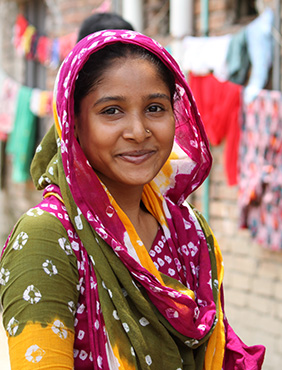The United Nations Population Fund (UNFPA) and its partners are implementing a Menstrual Health and Hygiene (MHH) project for women and girls in two urban slums of Dhaka using Cash and Voucher Assistance (CVA). The project has a dual objective of responding to period poverty in Bangladesh - the struggle many socio-economically vulnerable women and girls face when trying to afford menstrual products as exacerbated in the wake of the COVID-19 pandemic - and helping break existing taboos surrounding menstruation. The project started in February 2022 to serve more than 3,300 women of reproductive age (15-49 years old) and adolescent girls.
In Bangladesh, women and girls face financial and socio-cultural barriers to purchase menstrual products, with this important need not being prioritized in their households. UNFPA supports women and girls in their menstrual health and hygiene management by supporting them to redeem monthly vouchers to purchase various brands of menstrual pads. This is facilitated by the UN World Food Programme (WFP) blockchain-based digital system called ‘Building Blocks’.
The approach taken by UNFPA integrates CVA as part of a broader programming strategy. Along with receiving CVA for menstrual health and hygiene (MHH), recipients also receive a small cash transfer to compensate for their participation in training and learning sessions where they receive information on menstruation. These sessions help challenge existing taboos surrounding menstruation and contribute to lasting social and behavioral change related to MHH.
In Dhaka, in the two slums of of Bashantek and Duaripa, UNFPA, WFP and their implementing partners Bangladesh Rural Advancement Committee (BRAC) and Concerned Women for Family Development (CWFD) have coordinated and harmonized assistance to ensure a multiplied impact. While WFP covers the food security needs of the most socio-economically vulnerable households in the slums through cash distribution, UNFPA provides an additional transfer tailored to the number of women and girls in each household. Recipients receive the transfers from both agencies through the same blockchain-based card and can use them to make purchases according to their preferences in more than 20 local community shops who have accepted to join the project.

